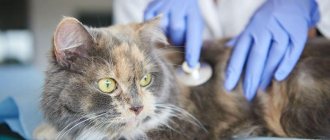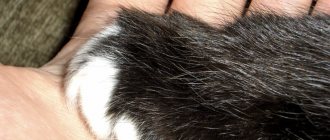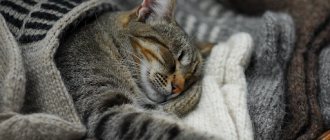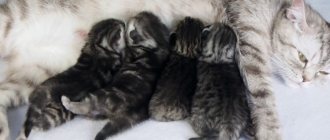Meowing is part of a cat's DNA. Some sing often, while others make almost no sounds. However, it is alarming when a cat starts meowing for no apparent reason. This may indicate a health or environmental problem.
If you can't find a reason why your cat is meowing, it's likely that she's hungry, thirsty, wanting attention, or showing emotions such as fear, loneliness, or stress. Look at your cat's surroundings to see if anything is upsetting her. On the other hand, meowing indicates a health condition or injury. Examine your cat for any signs of pain or discomfort.
Even if you can't find a reason for your cat's vocalization, there must be one. If you are trying to find the cause, look for changes in the cat's behavior, no matter how subtle they may be.
Can cats meow constantly for no reason?
Meowing for no reason is impossible. The cat's meow is a verbal, that is, vocal, method of communication. Our pets use it in only 2 cases: for communication and to attract attention. In the first case, they just talk, and in the second, they try to explain what exactly is bothering them.
Thus, there is always a reason, and, in addition to banal boredom due to attention deficit, it may be a life-threatening pathology.
The mechanism of sound production when purring
Some scientists put forward their theories about the source of rumbling, offering the following options.
Vocal cords are used by cats to meow, which humans hear when the animal makes the sound with its mouth open. If it is closed, then the vibration, which occurs due to the same work of the ligaments and throat, touches a special bone located under the tongue.
The sinuses increase vocal resonance. When an animal's mood changes, the speed of blood flow increases, that is, a change in blood pressure occurs. Vibration of the chest causes vibrations, which are converted into sound in the sinuses.
The involvement of the lungs in the process was established through observation of animals: purring is not the same when inhaling and exhaling.
Why does a cat constantly meow for no apparent reason?
“Meows for no apparent reason” is a more correct formulation. You may not actually be able to see the real source of the problem, so try to find it first. Associated symptoms, including behavioral changes, will help you with this.
Physiological desires
Non-dangerous explanations include physiological desires. This includes:
- Hunger and thirst. Cats use the loudest and most demanding “meow” when asking for food. It is with its help that they wake up their owners early in the morning and beg for treats or supplements. They may also not like the freshness of the water, which means it’s time to update it.
- Instinct of reproduction. Features of manifestation depend on gender. Cats actively mark their territory, and cats roll around on the floor and freeze in a characteristic pose. They have only one thing in common: during sexual hunting, both of them cry heart-rendingly, inviting a partner for mating.
- Desire to defecate. If the screams are accompanied by jumping, then the pet is simply preparing to go to the toilet. Your help will only be needed when the “meow” is a request to change the filler.
In all of these situations, only anxiety and increased activity are acceptable. The general condition of the animal must remain satisfactory.
To attract attention
A request to change the filler and water is also attracting attention, but this section is about something a little different. Sometimes a pet is completely satisfied from a physiological point of view, but still continues to scream, pursuing the following goals:
- Request for help. Kittens often call for help if they cannot get off a high surface or get stuck behind a cabinet. Also, mustachioed pets love to be hysterical so that the door will be opened for them. And it doesn’t matter that in a minute they will have to go through it again.
- Communication. A small amount of games, petting and talking is unacceptable for contact animals. With their voice they ask to be held or called to play.
Separately, it is worth noting the manipulations. With a plaintive “meow,” a cunning pet can beg for a piece of your dinner or the right to sleep on the kitchen table.
Pain, discomfort
If a meowing cat looks painful, examine it. Check your stomach first. Most often, meowing is associated with stomach pain, but in addition to it, there are other causes of discomfort:
- Diseases of the urinary system. KSD and cystitis increase the vulnerability of the mucous membrane. In severe cases, blood appears in the urine.
- Gastrointestinal diseases. In addition to the stomach, pain syndrome can also affect the intestines. In both cases, symptoms include bowel movements and vomiting.
- Helminthiases. The activity of helminths causes severe intoxication, therefore, as with gastrointestinal diseases, diarrhea and nausea are noted. With severe damage, it is possible to detect eggs and the parasites themselves in the feces or in the anus area.
- Tumors. Cause pain due to pressure on nerve endings. May be accompanied by weight loss, severe apathy and sleep disturbances.
- Injuries. Not all damage is visible to the naked eye. Some injuries can only be detected with an x-ray.
- Flea or tick infestation. Accompanied by severe itching and hair loss. Some types of parasites are also dangerous to humans.
- Viral and bacterial infections. Most infectious lesions are characterized by high fever, loss of appetite, severe lethargy and hoarseness of the voice.
- Consequences of sterilization or castration. The only non-dangerous situation caused by unpleasant recovery from anesthesia. Complications are possible here, but with proper care of the operated patient they occur very rarely.
Cats are very patient. They are able to suppress any unpleasant sensations for quite a long time. If your pet is screaming in pain, do not hesitate to diagnose, as the discomfort he is experiencing has reached its limit.
Irritation, stress, fear
Another reason is an unpleasant situation. The animal may react to it in the following ways:
- Irritation. Cats get annoyed when they are petted against their will. In response to unsolicited affection, they may meow aggressively, slash with their claws, or cling to your hand.
- Stress. Moving, having a new family member, traveling on public transport and other situations that differ from the usual way of life require getting used to. The animal will worry and scream until it feels safe.
- Fright. Many mustachioed pets do not like thunderstorms, fireworks, loud screams and the noise of a vacuum cleaner. When the source of anxiety disappears, they calm down and become silent.
Prolonged and too frequent stay in a tense state is fraught with a nervous breakdown. To avoid mental problems, the animal needs to demonstrate the safety of the threat or try to eliminate it.
Psychological diseases
Old pets, like their owners, are not protected from Alzheimer's disease. A plaintive “meow” at night may be associated with disorientation in space due to memory problems.
Imminent birth or false pregnancy
During a close birth, the animal feels vulnerable and uncomfortable. Young mothers awaiting the birth of their first kittens feel especially nervous. Similar feelings arise during false pregnancy.
Territory defense
An angry meow in a raised voice, reminiscent of a scream, is a sign of aggression. With its help, the animal protects its territory from invaders. Similar behavior is observed when keeping several mustachioed pets at the same time or when moving to a new place where there are no cat odors yet.
Communication with man and fellow humans
The most talkative breeds are Orientals. They constantly communicate with their owners, coming up with more and more new “meow” sounds for different occasions.
Animals also talk to each other, but meowing is most often used by mother cats communicating with kittens, as well as those who defend their territory. Adult and friendly pets are more prone to purring.
Possible health problems
The root cause of a cat constantly meowing can be a number of diseases.
- Injuries of varying severity cause a plaintive meow. This could be a bruised paw after an unsuccessful jump, or a serious fracture. The risk group includes older animals whose bones are more fragile.
- With spinal injuries, the meowing turns into hysterical screams, and the animal trembles.
- A quiet meow, accompanied by wheezing, elevated body temperature, and discharge from the nose and eyes, signals the presence of a viral disease.
Injured pet
- Severe poisoning can be determined by loss of interest in food, vomiting, loose stools, and diarrhea. These same signs indicate the presence of worms. Kittens especially suffer from intoxication.
- Severe infectious diseases are characterized by weakness, loss of appetite, and continuous screaming.
- A tick embedded in a sensitive spot on the skin causes the cat to scream, behave extremely restlessly, and constantly scratch the bite site. Ear mites cause you to constantly shake your head and scratch your ears.
- In addition to meowing, an allergic reaction is accompanied by sneezing. The cat shakes its head and scratches its muzzle. His eyes are watering and his nose is running.
- If each bowel movement causes obvious discomfort to the animal. The cat lingers on the tray for an unusually long time, screaming pitifully in the process. Most likely, the pet has problems with the intestines, kidneys, and genitourinary system. This could be cystitis or urolithiasis.
What to do if your cat meows?
If your cat meows, find out what is bothering her. Depending on the situation, the problem can be solved with attention, education or treatment.
Find out the reason
First, make sure that your pet is not in danger. If he looks healthy, check the relevance of the physiological desires listed above. Very often the problem is solved by feeding, changing water or filler. When sexually hunting, you can simply wait or resort to castration, since taking hormonal drugs provides only a temporary solution to the problem and often leads to complications.
Give enough time, talk, caress
If the animal does not have enough attention, try to allocate more time for stroking and talking. Regardless of the situation, you need to communicate with your pet daily. Regularity is much more important than duration, but ideally both conditions should be met.
Treat your pet with special warmth when he is nervous or afraid. Your affection will give him a feeling of security, but it is better to avoid pity. Behave as usual so that the cat is convinced that there is no real threat from the irritating factor.
Parenting moments
Behavior correction is necessary for hyperactive animals and manipulative pets. If your cat lacks attention due to excess energy, buy him interactive toys and play with him more often before going to bed.
Manipulators will have to be dealt with using classic methods: ignoring or punishment. The same goes for those who are too talkative. If your cat's talkativeness tires you, make comments to him. To do this, use a strict intonation, but avoid shouting.
Remember that this method is effective only in certain situations (bedtime, your illness, severe stress after work). Too frequent tugging or ignoring can offend the mustachioed person and have a negative impact on his psyche.
When to visit a veterinarian
You should contact a veterinarian in 2 cases: if you have any alarming symptoms and if there is prolonged meowing that has no justification. Some pathologies, including psychological diseases, occur unnoticed in the early stages of their development. Because of this, a complete examination of the animal is required to make a diagnosis.
You may also need help from a veterinarian to suppress sexual desire and relieve stress. In the first case, you will have to resort to surgical intervention, and in the second, to taking sedatives.
Pregnancy
Why does a pregnant cat meow for no reason? During this period, the animal undergoes serious hormonal changes in the body. Pets often vomit in the morning. The cat feels discomfort. At the same time, the pet does not understand what is happening to it and reacts to a change in its physical state by screaming. This is normal. However, if the cat becomes too restless and constantly refuses to eat, then consultation with a veterinarian is necessary. It is possible that she has a pregnancy pathology.
Some cats may go into heat while pregnant. It usually occurs between the third and sixth weeks of pregnancy. This phenomenon is associated with hormonal disorders. Therefore, if a pregnant cat asks for a cat, she should be shown to a veterinarian.
In late pregnancy, cats meow when they sense that labor is approaching. Sometimes pets make quiet but constant sounds, as if talking with future cubs.
Meowing in small kittens
Kittens up to 2.5-3 months are highly dependent on their mother. With their meowing, they inform her about hunger, fear and lack of attention, that is, they do the same thing as adult animals. The only difference is that all the kids run to the cat for help, and not to the person. Because of this, immediately after moving, they experience extreme stress and do not immediately trust their new owner.
Conclusion
If a cat meows loudly, do not rush to draw conclusions and carefully study the situation. Do not forget that a number of symptoms require immediate contact with a veterinarian. Ignoring in the case of pathology is not only useless, but also dangerous, so always show a reaction. The only exception is manipulation. If they are the problem, your attention will only make the unwanted behavior worse.
Do you like the article? 245
Diseases
Why does a cat meow for no reason for a long time, and it is impossible to calm her down? Most often this is due to poor health. In this case, you need to take your pet to the veterinarian as soon as possible. You should also carefully examine the animal and pay attention to the following signs:
- Screams when the stomach is touched. Such a symptom may indicate intestinal obstruction or helminthic infestation.
- Screams after a fall or walk. Most likely, the animal was injured. You need to carefully examine your pet, treat its wound and take it to the veterinarian.
- A plaintive meow near the tray. This often indicates urolithiasis.
- Old cats scream. In old age, many animals become more talkative. However, in some cases, loud meowing may be a sign of Alzheimer's disease. With this pathology, the animal is disoriented, constantly walks in circles and screams pitifully.
- Constant purring. Such sounds do not always indicate that the animal is experiencing pleasure. In some cases, this indicates cardiac problems. By making purring sounds, the cat is trying to normalize its heart rate. This manifestation can occur with tachycardia.
If you meow for no reason for a long time, you need to pick up the cat and try to calm it down. If the screams do not stop, then most likely your pet is sick.
Veterinarian advice
You can calm a cat that regularly yells at night with the help of medications or folk remedies, but veterinarians advise not to abuse either one. It may well be that the reason for your pet’s yelling lies in adaptation to the new home, fear of strangers (if you have guests), aggression towards other four-legged residents. The best remedy against yelling in this case is affection and attention.
If you nevertheless decide to resort to a sedative, veterinarians advise:
- do not abuse such drugs, as they are quickly addictive, and in the worst case, lead to serious health problems;
- closely monitor your pet’s well-being - the slightest signs of illness in the form of excessive drowsiness, nausea or vomiting may indicate an atypical reaction of the body to any component;
- Don’t buy a drug just because it helps your neighbor’s dog—the same dose will have different effects on animals of different species, sizes, and genders.
Before purchasing any sedative for your cat, be sure to consult with your veterinarian.
The cat hisses and yells in a voice that is not his own into an empty space
Hello! British cat. Neutered. 3 years. The last time I was examined was 2 years ago during castration. We feed canned food, sometimes dry food. Eats two to three times a day. A tray with wood filling is located in the kitchen. We play a lot, mostly hide and seek, running after each other. The cat is playful, but he doesn’t particularly like to sit in your arms, he comes very rarely and sleeps next to him. Regarding behavior, recently, out of the blue, he calmly walked into the kitchen, and as if something had shuddered him, he pressed himself to the floor, bristled all over, hissed and yelled in a voice that was not his own at me and my father, and what does his pose have to do with it? he had it, as if he was going to attack, I was scared, I poured water on him, and at least give him a damn. In short, he yelled and yelled... and left. We left the kitchen, he sits in the living room and glances sideways at the kitchen, although there is no one there. He communicates with us normally. Then I was afraid to go there all evening, so I had to take the food into the hall. The next day he again screamed in an unusual voice in an empty kitchen. Frightened, he returned from there and again did not go there for half a day. It happened again today too. Is he seeing someone there in the kitchen or is he cruising with his head? What to do with it? Maybe I need to take you to a doctor? Thank you. Regards, Anna.
The cat meows after eating
Desire to take a walk
The cat, accustomed to street walks, communicates its desire by means of a prolonged meow at the door of the apartment. “Meow” will sound louder, in lower tones, if the owner does not hear and does not react in any way. Dissatisfaction is expressed in a loud voice.
Equip a door for your pet, then he can independently leave his home and return from a walk. If the owner does not want to let the cat out because of bad weather, you need to try to distract him with play, conversation, and affection. A sedative will help you survive the stress of being weaned from a longed-for walk; a veterinarian will help you choose one.
Pathological hiccups
If your cat does not stop hiccupping during the day, experiences severe discomfort, and spasms last 7-10 minutes, you should be wary. Prolonged hiccups are the first symptom of a serious illness, and the range of possible pathologies is extensive, from pneumonia and problems with the cardiovascular system, to encephalitis and parasitic infestation. It happens that a cat suffers from allergies that affect the mucous membrane of the respiratory tract. Allergic hiccups are accompanied by lacrimation, difficulty breathing, frequent sneezing, and coughing.
Signs of concern:
- lack of coordination of movement, the cat staggers, walks in circles;
- anxiety, irritability, lethargy, change in habitual behavior, refusal to eat a favorite treat;
- hiccups are accompanied by nausea and bouts of vomiting;
- the cat wheezes and breathes heavily;
- The cat has urinary incontinence and there is blood in the stool.
For debilitating hiccups, contact your veterinarian. And as soon as possible. Do not self-medicate. Don't waste precious time. Only a veterinarian, after a comprehensive examination, will determine the cause of the pathology and prescribe treatment.
Tags
British cat Scottish cat or cat have that cat why does a cat scream made by a cat after If a cat screams Why does a cat meow Why does a cat meow Your cat is sometimes smart cat parents KITTENS SCHOOL OF PARENTS Why does a cat meow their cat or Why does a cat yell a hungry cat I that a cat screams a hungry cat why a cat screams apparent reasons for this to the veterinarian. The reason for meowing6 reasons Why a cat Why a cat Why a cat Why a cat Why a cat Why black Why black
screamcatdogfollowsnoscript











